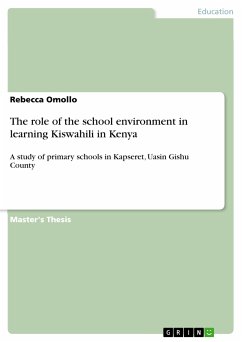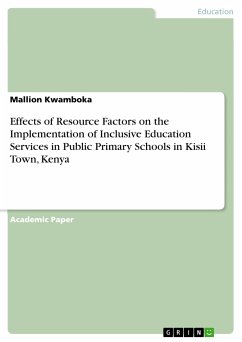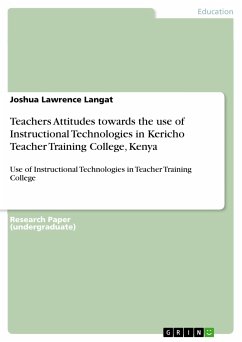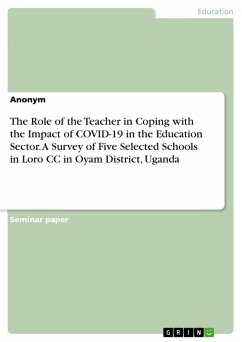
The role of the school environment in learning Kiswahili in Kenya (eBook, PDF)
A study of primary schools in Kapseret, Uasin Gishu County
Versandkostenfrei!
Sofort per Download lieferbar
Statt: 47,95 €**
36,99 €
inkl. MwSt. und vom Verlag festgesetzt.
**Preis der gedruckten Ausgabe (Broschiertes Buch)
Alle Infos zum eBook verschenkenWeitere Ausgaben:

PAYBACK Punkte
0 °P sammeln!
**Preis der gedruckten Ausgabe (Broschiertes Buch)
Master's Thesis from the year 2011 in the subject Pedagogy - School System, Educational and School Politics, grade: 4.00, Moi University (SCHOOL OF EDUCATION), course: Curriculum Instruction and Educational Media, language: English, abstract: This study investigated the effect of causal factors namely, availability of instructional resources, class size, school language policy and language of the catchment area on the teaching of Kiswahili at primary school since this is the formative stage of learning. The study was based on the sociocultural theory (SCT). The study was descriptive in nature....
Master's Thesis from the year 2011 in the subject Pedagogy - School System, Educational and School Politics, grade: 4.00, Moi University (SCHOOL OF EDUCATION), course: Curriculum Instruction and Educational Media, language: English, abstract: This study investigated the effect of causal factors namely, availability of instructional resources, class size, school language policy and language of the catchment area on the teaching of Kiswahili at primary school since this is the formative stage of learning. The study was based on the sociocultural theory (SCT). The study was descriptive in nature. The sample comprised of teachers of Kiswahili from selected primary schools. Kiswahili is one of the official national language in Kenya together with English. In primary school, it is one of the compulsory subjects that is nationally examined. There have been complaints about the poor performance of Kiswahili both at primary school level. The study recommends that schools should come up with clear and working language policies in order to promote the use of Kiswahili language. For example, all the teachers, workers and pupils should use Kiswahili when addressing each other, especially during assemblies and barazas. The findings of the study shall provide insight in understanding the role of school environment to the learning of Kiswahili at primary school level.
Dieser Download kann aus rechtlichen Gründen nur mit Rechnungsadresse in A, B, BG, CY, CZ, D, DK, EW, E, FIN, F, GR, HR, H, IRL, I, LT, L, LR, M, NL, PL, P, R, S, SLO, SK ausgeliefert werden.













